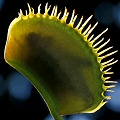Q: Why are my Venus flytrap's traps turning black?

Try smaller food
A: I commonly get e-mail like,
"I fed my plant--which I have named Jabberjaws--and it closed just fine, but why is the leaf turning black and dying?"
I have a couple of pieces of advice. First,
make sure that your plant is getting enough light!
A plant with inadequate light tends to get blackened traps more frequently.
Second, only feed your plants the appropriate kind of food. For example, do not commit
obvious sins like feeding your plant strange things like hamburger meat or
insects laced with pesticides.
Another feeding guideline is that you should make
sure that no part of the bug-meal sticks out of the trap. Any leg or wing
extending through the jaws increases the chance that the food
being digested will start to decay, and the rot may spread to
the rest of the leaf. If you feed a leaf a bug which barely fits into
the leaf, it is likely the leaf will die. The leaf should be at least three
times as large as the bug you are putting inside it. Small mouthfuls are easier for the
plant to digest.
As you feed your plant, learn about your plant's tastes.
Some bugs are better than others. If you find your plant dies when you
feed it moths, do not feed it moths. I find that large ants sometimes cause the leaf to
blacken. I'm not sure why. Perhaps the ants cause a lot of mechanical damage to the leaf as
they struggle.
Occasionally people write to me from some place in the world, and
ask me about the specifics of palatability of
the ants, flies, and other arthropods in their yards. The simple fact is,
I don't know! You'll have to experiment for yourself.
Page citations: Personal observation.